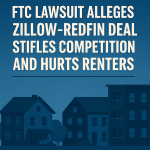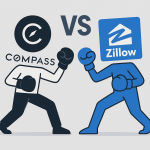By Dennis Norman, on September 30th, 2025 
FTC Lawsuit Alleges Zillow-Redfin Deal Stifles Competition and Hurts Renters
In what could be a major shake-up for the rental housing market, the Federal Trade Commission (FTC) has filed a lawsuit against Zillow and Redfin, claiming the two companies struck an illegal agreement that essentially kills off competition in the online rental advertising space. According to the FTC, Zillow paid Redfin $100 million earlier this year to abandon its multifamily rental advertising business, hand over key customer data, and even help Zillow poach Redfin employees. The result? Redfin stopped selling rental ads and now only displays Zillow’s listings on its Continue Reading →
By Dennis Norman, on September 20th, 2025 
A federal class-action lawsuit filed September 19, 2025, claims Zillow uses its dominant position in online real estate to mislead home buyers and conceal referral-based payments. The complaint states that Zillow “tricks [buyers] into signing up with a Zillow agent,” describing a system that hides Zillow’s involvement behind user-friendly website buttons and misleads consumers into thinking they are contacting the listing agent.
The lawsuit states: “Zillow’s website has a big button in bright blue lettering posted next to the house listing that says ‘Contact Agent’… Buyers, however, naturally believe they are contacting the listing agent. Instead, they are routed to Continue Reading →
By Dennis Norman, on June 24th, 2025 
A new lawsuit filed this week by Compass against Zillow has stirred up serious debate in the real estate industry, and while it may sound like a clash of two corporate giants, the real impact hits much closer to home, literally, for consumers, sellers, and real estate agents across the country, including right here in St. Louis.
In the 60-page complaint filed in federal court, Compass accuses Zillow of using its massive power and reach in the home search world to enforce what it calls an “anti-competitive ban” that hurts competition and restricts how agents can market listings for their Continue Reading →
By Dennis Norman, on May 8th, 2023 First and foremost, let me emphasize that home selling methods and practices are not a “one size fits all” approach. There are certainly situations where a different or unique strategy is required, including, in extreme cases, one that may not be in the seller’s best financial interest but favors a higher priority for the seller. For instance, I once handled a home sale for a woman with a stalker ex-husband who wanted her home sold discreetly – no sign, no ads, no MLS, etc. In her case, privacy and conducting the sale “under the radar” for her personal safety were Continue Reading →
By Dennis Norman, on October 11th, 2022 Below is our St Louis Real Estate Market Report for September 2022 for the City and County of St Louis combined. You can access the full infographic, containing data for St Charles, Jefferson and Franklin Counties as well by clicking on the image below. Worth noting and remembering is not all data is created equally nor is all of what you see reported accurate. Given the challenging and rapidly changing economic times we are in which are having an direct impact on the St Louis housing and real estate market, now, almost more than ever, you need to be sure Continue Reading →
By Dennis Norman, on September 15th, 2022 On Monday of this week, a federal lawsuit was filed in the United Status District Court for the Western District of Washington by Natalie Perkins and Kenneth Hasson against Zillow Group, Inc. and Microsoft Corporation. The suit was filed as a class action complaint on behalf of “All natural persons in the United States and its territories whose Website Communications were captured through the use of Session Replay Code embedded in Zillow’s website”.
In the complaint, the plaintiff’s allege that the defendants, Zillow and Microsoft, violated the Washington Wiretapping Statute (Wash. Rev. Code §9.73.030, et. seq.) through the use of Continue Reading →
By Dennis Norman, on November 1st, 2018 It would be an understatement to say that Zillow® has many real estate agents nervous about their future. It’s not just Zillow® though, it’s Amazon, big banks, and dozens and dozens of new real estate start-ups and changing business models.
A true dysfunctional family…
The most common name that comes up in real estate agent circles when discussing the impact of the internet on the real estate profession topic is Zillow®, and usually in the context of “the enemy“, so to speak. It seems to me the biggest fear among agents about Zillow® is that they want to eliminate real Continue Reading →
By Dennis Norman, on May 28th, 2017 I am always marveled by great marketing and promotion therefore I must give a tip of the hat to Zillow® for their new “Instant Offer” program. First, it’s getting them tons of attention and press, particularly within the REALTOR® community, which is probably where it is the most beneficial to them since agents are, after all, Zillow’s® paying customers. Continue Reading →
By Dennis Norman, on May 12th, 2017 Zillow, the behemoth real estate search site, revealed in it’s Form 10-Q filed with the Securities and Exchange Commission earlier this month for first quarter 2017, that the Consumer Finance Protection Bureau (CFPB) is investigating some practices by Zillow, apparently specifically their co-marketing program, and, according to Zillow’s filing, is alleging that Zillow violated parts of both RESPA as well as the Consumer Financial Protection Act. The complete Form 10-Q can be viewed here. On page 40 (outlined in red by me) is the section where Zillow makes this disclosure, and I have pasted that section of the report below as well (the emphasis and color have been done by me). Continue Reading →
By Dennis Norman, on June 25th, 2015 It wasn’t that long ago that sellers were practically begging buyers to purchase their home but that is not the case today. Today, in some very sought after St Louis neighborhoods the inventory of homes is so low and demand so high that when a new listing hits the market it’s like a feeding frenzy for buyers. This has led to frustration and disappointment for many buyers leading some to become a little too overanxious and buy a home that really is not right for them or overpay for one out of fear of “missing out”. Continue Reading →
By Dennis Norman, on March 13th, 2015 Renters are feeling more optimistic about the St Louis housing market as well as about the thought of home ownership with 23,721 renters in St Louis saying they are looking to buy a home in the next year, according to a report just released by Zillow. Continue Reading →
By Dennis Norman, on May 20th, 2014 While the St Louis housing market is improving, unfortunately the homeowners that can afford it the least are the ones that are still the hardest hit with 41.5% of all homeowners with a mortgage on a home in the bottom price tier (the 25% lowest valued homes in St Louis) being underwater on their mortgage, meaning they owe more than their homes are worth. This is according to the newly released Zillow Negative Equity report which shows that, at the opposite end of the spectrum, in the top tier, only 11% of St Louis homeowners are underwater, or in a Continue Reading →
By Dennis Norman, on March 18th, 2014 Two of the larger players in the real estate search website world, Realtor.com and Zillow, have come to blows over the past few weeks first with Zillow hiring Errol Samuelson, the former Chairman of Move, Inc. (the owner of Realtor.com) and then, most recently, hiring Curt Beardsley who, ironically, was the person promoted my Move to help fill the empty shoes of Samuelson. Yesterday, REALTOR.com fired back at Zillow filing a lawsuit against both Zillow, Inc. and Errol Samuelson for “breach of contract, breach of fiduciary duty, and misappropriation of trade secrets among others actions.”
In a statement, Steve Berkowitz, Continue Reading →
By Dennis Norman, on October 2nd, 2013
Three of every 10 Americans don’t qualify for a home loan, according to the Zillow Mortgage Market Place Analysis. The analysis also showed that only borrowers with a credit score of at least 740 should expect to get the best mortgage rates offered due to tougher mortgage lending standards.
In doing their analysis, Zillow analyzed a total of 13 million loan quotes and over 225,000 purchase loan requests from September 2013. What was revealed was that borrowers with a credit score under 620 who requested a home mortgage for a 30-year fixed-rate loan, were unlikely to receive a loan. Continue Reading →
By Dennis Norman, on May 23rd, 2013 Slightly over 1 of every 4 (26.4 percent) St Louis homeowners with a mortgage are underwater or, in other words, in a negative equity position owing more on their mortgage than their home is currently worth, according to a report by Zillow. This is slightly higher than the national rate of 25.4 percent and, unfortunately, is predicted by Zillow to increase in the coming months to about 26.7 percent by January 2014.
In addition to the St Louis homeowners that are underwater, the report indicates that another 20.7 percent of the St Louis homeowners with a mortgage have less than Continue Reading →
By Dennis Norman, on May 20th, 2013 In over half (58 percent) of St Louis neighborhoods it is a better move financially to buy a home rather than rent a home, according to a report just released by Zillow. According to the report, in 49 neighborhoods in the city of St Louis (of 76 in the report) and in 42 neighborhoods in the county of St Louis (of 87 in the report) it makes more sense to buy a home than rent.
In putting this list together, Zillow looked at the costs associated with buying and leasing a home, including up front payments, fees as well as Continue Reading →
One-third of Homebuyers Surveyed Are Ill-prepared to Get a Mortgage
Tyler Frank,Paramount MortgageNMLS ID 942420
According to a survey recently conducted by Zillow, many homebuyers are really not armed with the information they should have before attempting to obtain a mortgage. For example, over one-third (34 percent) of the prospective homebuyers surveyed did not know that a qualified borrower can obtain a home loan today with less than a five percent downpayment.
In addition, many homebuyers have misinformation that can prevent them from obtaining the best possible mortgage interest rate. For example, 26 percent of the homebuyers said Continue Reading →
By Dennis Norman, on February 23rd, 2013 There were 23,348 fewer St. Louis homeowners underwater on their mortgage (owe more than the current value of their home) or, in other words are in a “negative equity” position, at the end of 2012 than there were at the beginning of the year, according to the Zillow® Negative Equity Report for 4th quarter 2012. Continue Reading →
By Dennis Norman, on February 15th, 2013 The real estate market is definitely heating up in many cities throughout the U.S. as well in many areas of St. Louis. A decreasing inventory of homes for sale, and even a shortage of homes for sale in many areas, along with increased confidence from consumers in the real estate market, has driven many cities from a “buyers market” to a “sellers market”. Continue Reading →
By Dennis Norman, on February 11th, 2013 Before you get all excited, no, St. Louis did not make the top ten list of the best cities in America for young singles to relocate for love. Wait, before you think I have lost my mind, or are using a cheesy seasonal top-ten list for readership, it’s not my doing….it’s actually Zillow’s idea. This week, Zillow introduced their “In the Move for Love Index”, which lists the best cities for young singles to relocate for love. In evaluating locations for their list, Zillow considered the cost of rent versus income, walkability of the city as well as “supply and demand”…well, um, “the ratio of, and abundance of, single males to single females under 35”. Continue Reading →
By Dennis Norman, on December 27th, 2012 A panel of 105 professional economic forecasters from all around the country expect home prices to increase 3.1 percent in 2013, according to the December 2012 Zillow Home Price Expectations Survey. Forecasters are more optimistic about home prices than they were just three months earlier when they predicted 2013 home prices would only increase by 2.4 percent. Continue Reading →
By Dennis Norman, on August 2nd, 2012 Assuming you plan to stay put for 3 years or more, buying a home is a better financial decision than renting a home, according to a new report by Zillow. To arrive at this conclusion, Zillow analyzed the “breakeven horizon” in more than 200 metropolitan areas and 7,500 U.S. cities to determine how many years it would take owning a home before it becomes more advantageous than renting the same home from a financial perspective. In more than 75 percent of those metros analyzed, within about 3 years a homeowner would break-even on owning a home versus renting a home. Continue Reading →
By Dennis Norman, on July 27th, 2012 Over one in four homeowners in the U.S. with a mortgage are “underwater” meaning they owe more on their homes than they are currently worth and, according to data just released from a survey by Zillow, 75 percent of them are underwater by 40 percent or more meaning it will most likely be many years until they even have the hope of seeing equity in their home again. Nonetheless, this has not deterred the majority of these underwater homeowners from “staying the course” as 59 percent said would not consider a strategic default in order to get out from under their home. Continue Reading →
By Dennis Norman, on July 24th, 2012 St Louis home prices have not hit bottom yet, according to a report just released this morning by Zillow, which shows that St. Louis home prices fell by 4.0 percent in the second quarter of 2012 from the year before. St Louis home prices are predicted by Zillow to fall another 2.6 percent in the coming year. Continue Reading →
By Dennis Norman, on June 26th, 2012 A survey conducted by Zillow compiled from 114 responses by a diverse group of economists, real estate experts and market strategists, reveals that economists expect home prices to decline only slightly in 2012 (0.4 percent for the year) and then be on the rise. According to Zillow, this is the first time the individual economists surveyed were largely in agreement on where U.S. home prices are headed, signaling that a true bottom may be imminent. Continue Reading →
By News Desk, on May 27th, 2012 Rents Rise in Three-Quarters of Markets, According to April Zillow Real Estate Market Reports National home values rose for the second month in a row, climbing 0.7 percent from March to a Zillow Home Value Index of $147,300. This is the largest monthly increase in home values since January 2006, when they rose 0.8 percent, according to the April Zillow® Real Estate Market Reports. Rents also rose from March to April, increasing 1.6 percent, according to the Zillow Rent Index. Rents rose in 78 percent of the 178 markets covered by Zillow. Continue Reading →
By News Desk, on May 25th, 2012 But Negative Equity is a Paper Loss for Most, As 90% of Underwater Homeowners Pay Mortgage on Time Nearly one-third (31.4 percent) of U.S. homeowners with mortgages – or 15.7 million – were underwater on their mortgage in the first quarter of 2012, despite rising home values, according to the first quarter Zillow® Negative Equity Report[1]. Collectively, underwater homeowners owed $1.2 trillion more than their homes were worth. Negative equity rose slightly from 31.1 percent in the fourth quarter, and declined from 32.4 percent one year ago. Continue Reading →
By Dennis Norman, on March 13th, 2012 A report released today by Zillow shows that median rents rose 6.1 percent in St Louis to $1,085 from January 2011 to January 2012 while, during the same period, home prices fell 6.9 percent to $120,300. According to the report, over two-thirds (69.2 percent) of the metro areas covered saw year-over-year gains in rents but only 7.3 percent of the metros saw home values rise during the same period. Continue Reading →
By Dennis Norman, on December 28th, 2011 While losing $700 Billion in value in U.S. homes in a year sounds horrible, the good news is, if we end this year around this number the total loss in home values for 2011 will be smaller than the prior four years! This information is from the newly released Zillow Real Estate Market Reports, which also predicts that nine metro areas will see gains in home values this year once the final numbers are in! With all this “good” news, we have to ask ourselves…is the worst of the real estate market crash over? I think the answer is yes, at least when it comes to the housing market. Continue Reading →
By Dennis Norman, on October 31st, 2011 You would think after what we have seen happen in the housing market during the past 5 years, especially in the area of falling home prices, that home buyers today would not have lofty expectations about a home they buy appreciating, but apparently many do. According to a recent survey Zillow, 42 percent of prospective home buyers believe home prices typically appreciate by 7 percent a year. Continue Reading →
|
Recent Articles
Helpful Real Estate Resources
|





